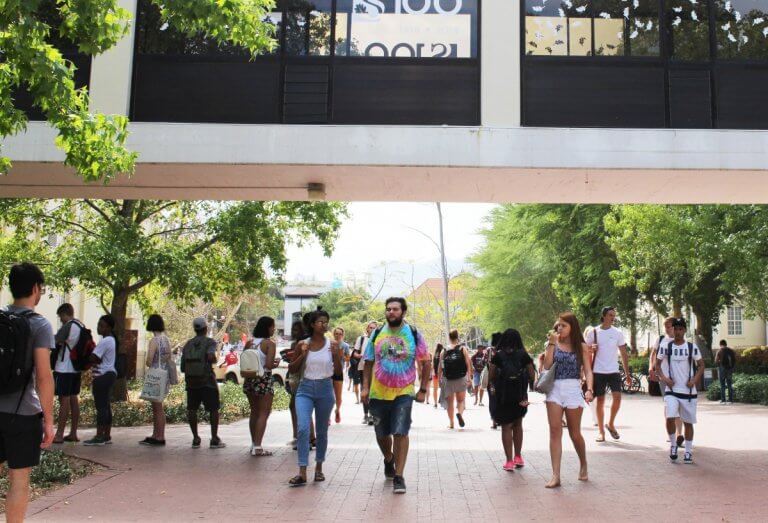
Starting university upon completing secondary or high school is an adventure itself, but if you’re up for a life-changing experience while working your way towards a degree, why not consider studying in South Africa?
This ethnically-diverse country has a whopping 11 official languages, while former President of South Africa Nelson Mandela, comedian Trevor Noah and actress Charlize Theron are some of the prominent individuals to hail from the country. Famous people aside, South Africa can be considered an off-the-beaten-track option for students looking for a unique yet enriching study experience.
Apart from being a more affordable study abroad option compared to locations such as the US and the UK (depending on the university, annual tuition fees for international students can cost approximately US$4,000), the country is also home to some of the world’s top universities.
This includes Stellenbosch University, ranked among the top 350 universities in the Times Higher Education World University Rankings 2019, and the top 20 in BRICS countries. This research-intensive university is among South Africa’s leading tertiary institutions based on research output, student pass rates and rated scientists. Stellenbosch is also recognised internationally as an academic institution of excellence.
It boasts the highest weighted research output per full-time academic staff member of all South African universities, and the second-highest number of scientists in South Africa who have been rated by the National Research Foundation (NRF). Its website notes that it has the highest student success rate in the country.
Expertise in AgriSciences
The modern agricultural sector faces numerous challenges in producing high-quality food that’s sustainable and cost-efficient, while the demand for Agricultural Science (AgriSciences) experts are needed in light of the world’s growing population. This makes it a promising field for prospective students to branch into.

Source: Stellenbosch University
Stellenbosch is known for its AgriSciences education. Reflecting this multidisciplinary field is the university’s Faculty of AgriSciences, which houses 12 departments, including Agricultural Economics, Agronomy, Animal Sciences, Conservation Ecology, Food Science, Forest and Wood Science, Genetics, Horticultural Sciences, Plant Pathology, Soil Science, Viticulture and Oenology and Experimental Farms.
The university offers both undergraduate and postgraduate programmes in the field, while its academic research expertise and study programmes are aligned with industry needs, as well as the concomitant scientific advances required for plant production, animal sciences, management and natural resource management. This is reflected in Stellenbosch’s modern and globally-known departments, taught by highly-qualified staff who are dedicated to teaching, scientific advancement, industry collaboration and community service.
Apart from academic know-how, the university also boasts well-equipped laboratories. The faculty has two experimental farms where practical training and applied research are conducted; its integrated multidisciplinary approach, innovative research outputs, scientific achievements and problem-focused research and development activities ensure the continued relevance of their research programmes and graduates.
Pioneering research
The university’s Faculty of AgriSciences has been growing leaps and bounds – it awarded 236 professional degrees in 2018 – the highest number to date – and maintained the postgraduate student cohort with 312 master’s and 158 PhD candidates in 2018. The Faculty also saw graduate 97 master’s and a record number of 45 PhD students.
Meanwhile, the university is actively engaged in research that contributes to the betterment of the field. Some of these include the study of phenolic compounds in both “unfermented” (green) and fermented honeybush tea, an indigenous plant from South Africa, as potential indicators of bitterness; a dragonfly study that provided a new tool to determine freshwater health in Africa – this tool, called the African Dragonfly Biotic Index, can be used to assess the ecological state of freshwater resources; and the sustainable land use planning in areas where invasive alien plants have been removed – this research can help decision makers improve land use planning in future.
Food science
Apart from their research, the faculty is also stepping up its efforts to support food safety in South Africa by launching their on-campus Centre for Food Safety (CFS).
Situated in the university’s Department of Food Science in the Faculty of AgriSciences, the CFS is the first of its kind in the country; a unique applied food science research consortium comprising of scientists working at Stellenbosch and in the food industry. CFS will conduct research on food safety; provide expert advice to the industry, policymakers and other stakeholders; and promote consumer awareness. Meanwhile, Tiger Brands, one of the founding members, has given R10 million (US$69,000) to help establish the centre.
Unsurprisingly, the Faculty of AgriSciences is held in high esteem for the quality of its training and research, also as a consultant in the agricultural and forestry industry. Students enrolled in the faculty’s undergraduate and postgraduate programmes are trained to become leaders and managers in various industry sectors. Throughout the RSA – and abroad – alumni can be found in top positions.
Being a student at Stellenbosch Faculty of AgriSciences is a firm step towards developing your personal and professional capacity, opening a potential career in the dynamic world of AgriSciences.
Follow Stellenbosch on Facebook, Instagram or Twitter
Liked this? Then you’ll love…
StellenboschU: A world Top 100 university for AgriScience education
Students love studying AgriSciences at Stellenbosch – here’s why you will too…







